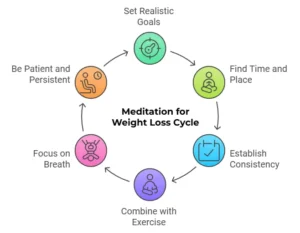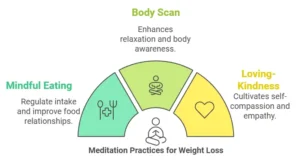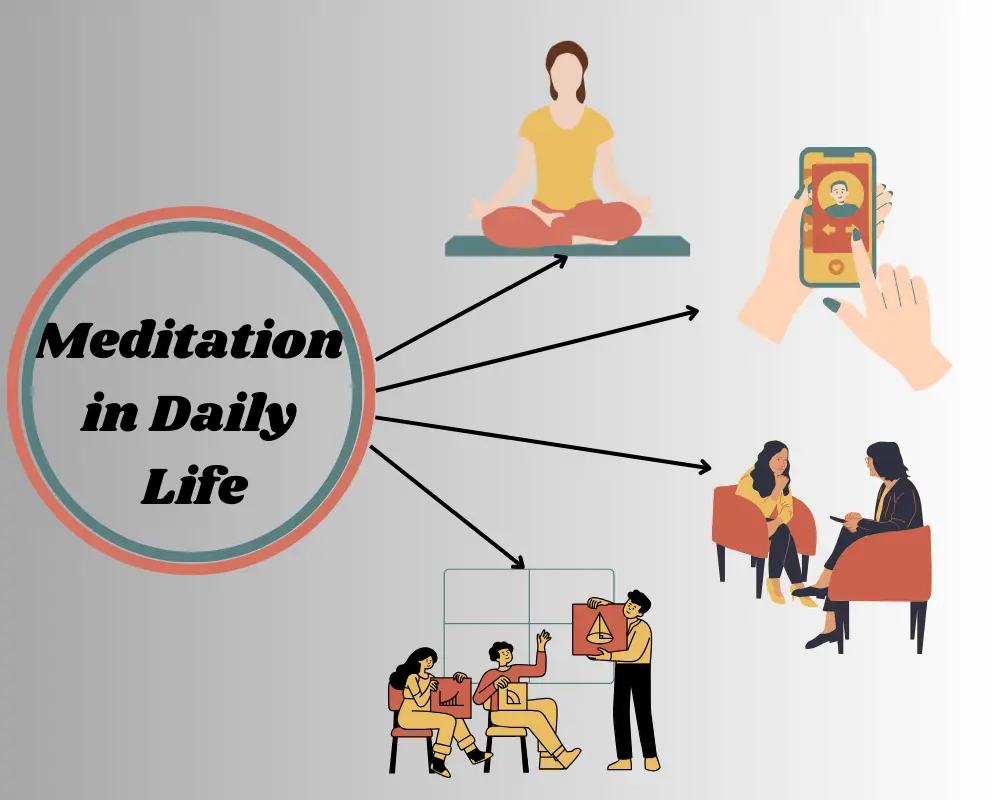How To Meditate For Weight Loss

In today’s fast-paced world, where weight loss has become a significant concern for many, knowing how to meditate for weight loss stands out as a powerful yet frequently undervalued technique. Meditation is not just about calming the mind; it also plays a crucial role in shedding those extra pounds.
This article explores how meditation can contribute to weight loss, the science behind its effectiveness, and practical tips to incorporate meditation into your daily routine for optimal results.
Meditation and Weight Loss
Numerous scientific studies have investigated the relationship between meditation and weight management. Research suggests that meditation can be an effective tool for supporting weight loss and maintenance through various mechanisms. A study titled “Mindfulness Meditation and Weight Loss conducted by Smith et al. in 2014 found that mindfulness meditation interventions were associated with significant reductions in body weight and body mass index (BMI) among participants.
Benefits of Meditating for Weight Loss
When individuals experience stress, they release cortisol, a hormone that facilitates fat storage, particularly around the abdominal region. This excess fat accumulation can contribute to weight gain and related health issues.
Mindless eating, which involves eating without paying attention, is a major cause of weight gain and obesity. In today’s world, with so many food choices and distractions, people often eat without thinking, leading to overeating and weight gain.
However, by practicing meditation regularly:
- Individuals can lower their cortisol levels, which helps prevent stress-related weight gain and abdominal fat accumulation. Reduced stress levels also lead to better mood, increased energy, and improved overall well-being.
- Meditation enhances body awareness by helping individuals tune into their physical sensations and emotions. Increased body awareness allows individuals to recognize hunger and fullness cues more effectively, leading to better portion control and reduced overeating. By being more in tune with their bodies, individuals can make healthier choices about food and exercise, leading to improved weight management outcomes.
- Regular meditation practice strengthens self-control and impulse management skills. Enhanced self-control allows individuals to make more conscious intentions about their food choices, leading to better weight management results.
Headspace outlines a study showing that mindfulness meditation can help reduce stress, which is linked to overeating and weight gain. Meditation has been found to decrease cortisol and C-reactive protein levels, aiding in weight management (Headspace).
Another study published in the Journal of Obesity in 2017, reported similar findings, highlighting the positive impact of mindfulness-based interventions on weight loss outcomes.
How To Meditate For Weight Loss

Setting Realistic Goals
- Begin by setting realistic and achievable goals for your meditation practice.
- Consider what you hope to accomplish through meditation, whether it’s reducing stress, improving body awareness, or supporting weight loss efforts.
- Break down your goals into smaller, manageable steps to help you stay focused and motivated.
- Be realistic about the time and effort you can commit to meditation, and set goals that align with your lifestyle and schedule.
Finding the Right Time and Place
- Identify a time and place where you can comfortably practice meditation without distractions.
- Choose a time of day when you are least likely to be interrupted, such as early morning or before bedtime.
- Create a peaceful and quiet environment for meditation, free from noise and other distractions.
- Consider using props such as cushions or chairs to support your posture and make your meditation space more comfortable.
Establishing Consistency
- Creating a good meditation program requires consistency.
- Commit to practicing meditation regularly, ideally daily.
- Begin with brief meditation sessions, ranging from five to ten minutes, and progressively extend the time as you feel more in harmony.
- Schedule your meditation sessions at the same time each day to help establish a routine and make it easier to stick to your practice.
- Be patient and understand that building a meditation habit takes time and persistence.
Combining Meditation with Exercise
- Exercise and meditation complement each other to support overall well-being and weight management.
- Both practices help reduce stress levels, which can contribute to weight gain and unhealthy eating habits.
- Regular exercise enhances physical health, improves mood, and promotes better sleep, while meditation reduces stress and enhances mental clarity.
- Combining exercise with meditation can create a synergistic effect, leading to better stress management, improved mood, and enhanced overall health.
Beginners’ Guide
- Start Small: Begin your meditation practice with short sessions, such as 5-10 minutes. As you become more comfortable with meditation, gradually increase the duration of your sessions. Maintaining a regular meditation program when you start small is easy since it reduces feelings of overwhelm and builds momentum.
- Focus on Breath Awareness: Use your breath as a focal point during meditation. Notice the flow of your breath through your body. Breath awareness helps anchor your mind in the present moment and promotes relaxation and concentration.
- Be Patient and Persistent: Realize that mastering meditation is a skill that requires time. Be patient with yourself and avoid judging your meditation experiences. Stay persistent in your practice, even when it feels challenging or restless.
Types of Meditation Practices for Weight Loss

Mindful Eating Meditation
- Mindful eating meditation involves paying full attention to the sensory experience of eating.
- People pay attention to the food’s flavor, texture, and aroma.
By engaging in mindful eating, individuals can better regulate their food intake and develop a healthier relationship with food. - This practice encourages individuals to eat more slowly, savor each bite, and be more in tune with their body’s hunger and fullness cues.
- Mindful eating meditation can help prevent overeating, reduce binge eating episodes, and promote weight loss by fostering a greater awareness of eating habits and behaviors.
Body Scan Meditation
- Body scan meditation is a practice that involves systematically scanning through different parts of the body, from head to toe, or vice versa.
- During body scan meditation, individuals focus on each body part, one at a time, paying attention to any sensations or tension present.
- Body scan meditation aims to enhance relaxation and body awareness by focusing on physical sensations and letting go of stored tension or stress.
- By regularly practicing body scan meditation, individuals can become more in tune with their body’s signals, including hunger and fullness signals, contributing to better eating habits and weight management.
- Body scan meditation can help individuals recognize and address emotional eating triggers by bringing awareness to the connection between physical sensations and emotions.
Loving-Kindness Meditation
- Loving-kindness meditation, also known as metta meditation, is a practice that involves directing positive thoughts, feelings, and intentions toward oneself and others.
- During loving-kindness meditation, individuals cultivate feelings of love, compassion, and goodwill towards themselves, loved ones, acquaintances, and even those with whom they may have difficulties or conflicts.
- By fostering feelings of self-compassion and empathy, loving-kindness meditation can help individuals develop healthier relationships with themselves and others.
- This practice can also reduce the likelihood of turning to food for comfort or emotional support, as individuals learn to nurture themselves and find inner sources of strength and support.
- By promoting emotional well-being and reducing stress, loving-kindness meditation can indirectly support weight loss efforts by addressing emotional eating and promoting a more balanced approach to food and eating.
Incorporating Meditation into Daily Life

Integrating Short Meditation Sessions into Daily Routines
- Incorporate short meditation sessions into your daily routine, such as when you wake up in the morning, during your lunch break, or before bed.
- Set aside a few minutes daily to sit quietly, focus on breathing, and practice mindfulness, even during a busy schedule.
- By integrating meditation into your daily routines, you can make it a consistent practice and reap its benefits throughout the day.
Utilizing Apps and Online Resources
- Take advantage of meditation apps and online resources to support your meditation practice.
- Explore a variety of guided meditation sessions, mindfulness exercises, and relaxation techniques available on these platforms.
- Apps like Headspace, Calm, and Insight Timer offer a range of meditation practices tailored to different needs and preferences.
- Utilizing these tools can make meditation more accessible and convenient, especially for beginners or those with busy lifestyles.
Consulting Meditation Instructors or Therapists
- Consider seeking guidance from experienced meditation instructors or therapists to deepen your meditation practice.
- Meditation instructors can provide personalized instruction, feedback, and support to help you develop and refine your meditation skills.
- Therapists trained in mindfulness-based approaches can offer additional support for managing stress, anxiety, and other mental health concerns through meditation.
- Consulting professionals can enhance your understanding of meditation techniques and tailor practices to address specific challenges or goals.
Joining Meditation Groups or Classes
- Joining meditation groups or classes can provide a sense of community, accountability, and support for your meditation journey.
- Look for local meditation groups, community centers, or wellness centers offering group meditation sessions or classes.
- Participating in group meditation sessions allows you to learn from others, share experiences, and cultivate a sense of connection with like-minded individuals.
- Group settings can also offer opportunities for guided meditation, group discussions, and collective mindfulness practices, enhancing the overall meditation experience.
Common Challenges and How to Overcome Them
- Restlessness and Impatience: If you experience restlessness or impatience during meditation, acknowledge these feelings without judgment. Gently guide your focus to your breath or selected meditation object whenever your mind wanders. Remind yourself that feeling irritated and restless throughout the meditation is normal and will pass with practice.
- Dealing with Distractions: Accept that distractions are a normal part of meditation and don’t get discouraged when they arise. Instead of trying to resist distractions, acknowledge them and gently redirect your focus back to your breath or chosen meditation technique. Experiment with different meditation environments or strategies to find what works best in minimizing distractions.
- Staying Motivated: Keep reminding yourself of the benefits of meditation, such as reduced stress, improved focus, and enhanced well-being. Set small, achievable goals for your meditation practice and celebrate your progress daily. Consider meditating with a group or using guided meditation apps to stay motivated and accountable.
Myths and Misconceptions
Some people mistakenly believe that meditation alone can replace the need for physical activity in weight management. While meditation offers numerous health benefits, including stress reduction and improved emotional well-being, it should not be viewed as a substitute for regular exercise.
Physical activity is essential for maintaining cardiovascular health, building muscle strength, and promoting overall physical fitness. It also plays a crucial role in calorie expenditure and weight management.
Another common misconception is that the primary goal of meditation is weight loss. While meditation can support weight management by reducing stress, promoting mindfulness, and enhancing self-awareness, its benefits extend far beyond weight loss.
Meditation is a holistic practice that promotes mental clarity, emotional balance, and spiritual growth. It can improve overall well-being and quality of life, regardless of its impact on weight.
Conclusion
Incorporating meditation into your weight loss journey can offer a multitude of benefits for both your physical and mental well-being. By practicing mindfulness and cultivating a regular meditation routine, individuals can reduce stress levels, improve body awareness, and enhance self-control, ultimately supporting their efforts toward weight management.
Additionally, integrating meditation with exercise, nutrition, and daily routines can create a synergistic effect, amplifying the positive outcomes of both practices. While meditation is not a standalone solution for weight loss, it is a valuable tool that complements other lifestyle changes, promoting holistic health and overall wellness.
FAQs
Is meditation alone enough for weight loss?
While meditation can support weight loss by reducing stress and promoting mindfulness, it is most effective when combined with a balanced diet and regular exercise.
How long does it take to see results from meditation for weight loss?
The timeline for seeing results from meditation can vary depending on individual factors such as frequency of practice, consistency, and overall lifestyle habits. Some individuals may notice improvements in stress levels and eating behaviors within a few weeks of starting a meditation practice, while others may require more time to experience significant changes.
Can meditation help with emotional eating?
Meditation can address emotional eating by promoting self-awareness, emotional regulation, and mindful eating habits. By developing mindfulness and self-compassion, individuals can healthily manage emotions and reduce reliance on food for comfort.
Are there any specific meditation techniques recommended for weight loss?
While various meditation techniques are beneficial for weight loss, practices such as mindful eating, body scan meditation, and loving-kindness meditation are particularly helpful in promoting mindfulness, self-awareness, and stress reduction, all of which contribute to better weight management outcomes.
Should I consult a healthcare professional before starting a meditation practice for weight loss?
It’s always a good idea to consult with a healthcare professional, particularly if you have any underlying health conditions or concerns. While meditation is generally safe for most people, make sure that it complements your overall health and wellness plan. Additionally, healthcare professionals can offer personalized guidance and support tailored to your needs and goals.